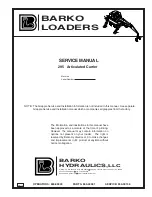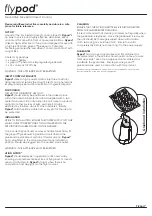
DirectFlo DF1400
Chapter 3: Using the DirectFlo
Comco Inc.
3-3
Issue Date: January 2009
Table 3-1: General Summary
of Factors Affecting Abrasive Blasting
Variable
Comments
Manual Reference*
The Abrasive
The abrasive you use has the most significant
impact on how well the unit works. Hardness,
sharpness, and particle size all affect cutting
speed. In general, the larger the particle size,
the faster the cutting or abrading will be.
See the information
under the
Abrasive
Selection
heading
within this chapter.
The Tank Orifice Other factors being equal, the amount of
powder flow is directly proportional to the size of
the powder orifice. The orifice should be sized
according to the abrasive used, so that a small
orifice is not used with large particles.
See the
Tank Orifice
discussion within this
chapter.
The Nozzle
Nozzles with larger openings produce larger
blast patterns, thus speeding up some blast
processes.
See the
Nozzle Size
discussion within this
chapter.
The Air
Pressure
The higher the pressure, the faster the work will
be abraded. Nozzles, hoses, and fittings also
wear out faster with higher pressures.
See the
Air Pressure
heading within this
chapter.
The Distance
between the
nozzle and the
work
Up to a point, the closer the nozzle gets to the
work the faster the material will be removed
beneath the nozzle. A distance of about 5-8
times the nozzle diameter will generally remove
the maximum material.
See the
Nozzle
Distance
discussion
within this chapter.
The Angle of the
abrasive stream
to the work
Cutting rate will improve as the nozzle is tipped
at an angle relative to the surface of the
material. Tipping the nozzle also tends to work
better for cleaning a surface.
See the
Angle of
Approach
heading
within this chapter of
the manual.
The Abrasive
Blend control
Fine adjustments in the amount of powder in the
air stream can be made with the powder flow
control knob on the front panel. Less powder
and more air tend to cut faster at close nozzle
distances.
See the
Abrasive
Blend
Adjustment
heading within this
chapter.
* Additional Information can be found in these chapters.
















































